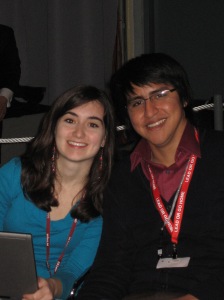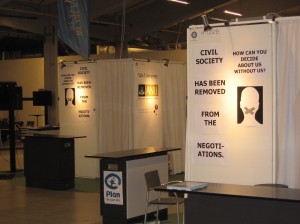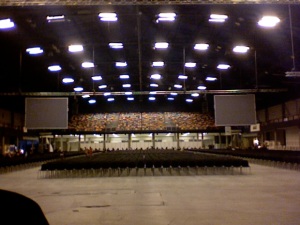By Oliver Bruce
I have to admit that I didn’t have high hopes for Copenhagen. I’d read the updates of the negotiations from Bonn, Bangkok and Barcelona. I knew they hadn’t made enough progress to pull together something substantive. So when I entered the Bella Center I was under no illusions as to any impact I could have and spent my first week twittering on where the free food was and meeting interesting people.
But as time went on, I could see the desperation increase among the tired negotiators I saw running from meeting to meeting. Each night, I’d get increasingly dire reports from Neil, a fellow COA student and party delegate for St Lucia, who was staying in my room. He despaired about the lack of transparency and power politics being played by the Danes. Somewhere along the line, it hit me that while I didn’t have high hopes for an outcome, I cared immensely about what was happening. Only over this last weekend, with the dust settling from the collapsed talks, and with a bit more information of what went on in the closing hours of the meetings has it all begun to truly sink in.
We failed.
Regardless of whether you were following the events in Copenhagen because you care about the planet, were interested in where carbon constrained business was headed, or because you somewhat sadistically enjoy subjecting yourself to UN bureaucracies, its obvious that what happened over the last two weeks was nothing short of a disaster. We’re now likely to have a set of short-term solutions, piecemeal agreements, and after the breaches of process and trust by the Secretariat and the Danes, a long period of tension and conflict in the international climate change arena. There is no common vision, no long term strategy – just a bunch of weak agreements that at this stage, don’t add up to much.
But the political and legal outcome is not really what this post is about. This post is more an expression of the grief and sadness that overcame me as I listened to leader after leader get up and deliver their “climate friendly” speeches and promise to do their part for climate. The frustration that came when it became obvious that my own country of New Zealand had appointed a minister who viewed the entire process as nothing more than a trade negotiation. The injustice of having all but less than 1% of civil society eventually restricted access to the talks.
I stopped caring that we’d not made enough progress in the negotiations prior to Copenhagen and began to ask why – why that even when faced with a potential catastrophe that affects the life-systems upon which we depend, we were unable to seize the opportunity to grow beyond the narrow-minded, sovereignty-obsessed politics that have constrained us until now? Why the common humanity that we share is not sufficient to overcome the constructed identities and barriers we place between each other?
I went to a United World College and then College of the Atlantic precisely to explore ways of being a better, more compassionate, more effective human being. I consider myself a strongly process-oriented person, who strives for inclusiveness and accountability. Despite my frustration with the UN, I consider international diplomacy a fundamental and necessary part of recognizing our fundamentally common nature as humans, and key to solving our collectively global problems. Yet my experience of last week, with its breaches of process, principles of transparency and simple lack of constructive cooperation, have given that faith a run for its money.
I, like many of my peers, sat in an old meatpacking factory on Friday of the last week to watch COA student Juan Soriano via video link deliver the youth address to the plenary. I could hear the anger and hurt in Juan’s voice when he declared that the negotiators “should be ashamed.” That after sixteen years of negotiations, we still can’t even come up with a common approach of how to deal with a problem that will affect all of us. The hurt that ebbed through his voice, as he quivered with frustration at the indignity of the situation, is the same sadness and grief I feel after seeing the circus that the international community put on when trying address a fundamentally common future.
Come on guys. We can do better. We need to do better.





